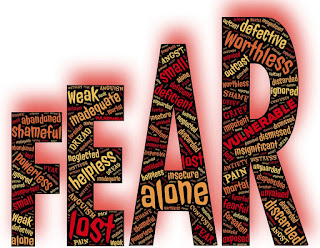
Perhaps one of the toughest
questions a client can ask and not just clients. My counselling students often
begin with that question; to start with a firm understanding of what therapy
entails and what benefits it might bring. Makes sense to me. My experience of
fear is that frequently it is dominated by the unknown. We are fearful of what
we don’t know, what we have yet to experience. We fill those gaps with
something we have read or heard from others and then, sometimes, with thoughts
that can seem dark and foreboding.
My answer is often, initially
at least, a disappointment: therapy is about the client so their experience of
it is personal; in essence the client owns it. So disappointing because it fails to fully
remove the unknown element. To step into the therapy room and not know what
this might mean.
 It may help to hear that, as
therapist, I don’t know either. At least I don’t know what the therapeutic
process is going to be with a new client. Working without expectations can seem
daunting but once I was used to that aspect to the work I found it liberating.
No client is indicative of any ‘type’, I can honour the truth and individuality
that is the person sat in front of me.
It may help to hear that, as
therapist, I don’t know either. At least I don’t know what the therapeutic
process is going to be with a new client. Working without expectations can seem
daunting but once I was used to that aspect to the work I found it liberating.
No client is indicative of any ‘type’, I can honour the truth and individuality
that is the person sat in front of me.
That may seem to contradict
all of the experiences we’ve had in the past and probably the way we often
treat others. All those stereotypes we use to try and make sense of the world
and the people we meet. In therapy, though, assumptions can cloud the truth of
who someone is.
Therapy, then is an open,
quiet space into which you can walk and explore feelings, thoughts and
experiences without the baggage of assumption. Therapy belongs to the client
and I think that might just be definition enough.






